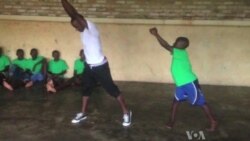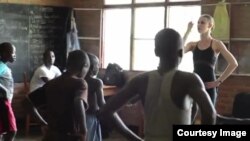NEW YORK —
Dancer LaMar Baylor can most often be found in New York performing in The Lion King musical on Broadway.
However, since 2011, he's also spent weeks in Kigali, Rwanda, teaching dance to boys living on the street, as part of an effort by the Rebecca Davis Dance Company.
"These children, their lives are nothing we can begin to even fathom," Baylor said. "They have been through things that no one should ever have to go through. They are genocide survivors. A lot of them have been incarcerated, they have been prostituted, they are street children, they have lost all of their family."
Dance lessons offer the children structured learning and self-expression they've never experienced before.
"You learn self-discipline, you learn how to conduct yourself in a classroom setting, you are able to express emotions through the choreography," he explained. "These things don’t just apply in a physical aspect. They also apply mentally and emotionally."
Off the street
Founder and director Rebecca Davis conceived the idea for the project after visiting Rwanda in 2008.
"I met a whole bunch of street kids who were dancing, doing exactly what I love to do," she said.
It occurred to Davis that dance could be used to get the children off the street and into a safe center that could be used as a springboard for further education.
"When you start to play music in Rwanda, these kids come out of nowhere and they enter the center," she said. "And it's because of dance that they have a way of exchanging their physicality, their survival skills that they learn on the street, and their strength, into something that's actually artistic and aesthetic, and that starts them on the path toward mental development."
Educational opportunities
Once a child masters the basics of attending class and following instruction, the student is enrolled in information and technology classes.
"Then, after we see the IT skills develop in the children, we find sponsors for the most successful, so they can go to boarding school and reenter the formal education system," Davis said.
All of the students in Rwanda are boys—few girls live freely on the street there, according to Davis. Those who win scholarships—about 30 so far—are sent to the Sonrise Boarding School in Musanze, about two hours from Kigali.
Reaching more children
While the largest program is in Rwanda, Davis has also set up programs in Guinea, where relations among ethnic groups are tense, and through an orphanage in Bosnia-Herzegovina—another country recovering from genocide.
"I was amazed to find that dance was once again a way of bringing together different groups, in this case, Bosnian, Serb and Croat," Davis said. "All of a sudden, your language, your religion, your ethnic background has nothing to do with the fact that we’re doing pliés and pirouettes and sauts de chat."
Students in Guinea and Bosnia-Herzegovina, both boys and girls, also take English language classes, with the goal of making them more employable.
In all, about 2,000 children in the three countries have been enrolled since the program began in 2010.
LaMar Baylor knows from his own experience how the discipline and self-expression of dance can be the springboard to a better life. He is from Camden, New Jersey, one of the poorest, most violent cities in the United States.
"Growing up there, if I did not have dance, I'm really not sure what I would have become," he said. "I was a child who took a long time to find out what exactly was for me. And when I found dance, it honestly saved my life."
However, since 2011, he's also spent weeks in Kigali, Rwanda, teaching dance to boys living on the street, as part of an effort by the Rebecca Davis Dance Company.
"These children, their lives are nothing we can begin to even fathom," Baylor said. "They have been through things that no one should ever have to go through. They are genocide survivors. A lot of them have been incarcerated, they have been prostituted, they are street children, they have lost all of their family."
Dance lessons offer the children structured learning and self-expression they've never experienced before.
"You learn self-discipline, you learn how to conduct yourself in a classroom setting, you are able to express emotions through the choreography," he explained. "These things don’t just apply in a physical aspect. They also apply mentally and emotionally."
Off the street
Founder and director Rebecca Davis conceived the idea for the project after visiting Rwanda in 2008.
"I met a whole bunch of street kids who were dancing, doing exactly what I love to do," she said.
It occurred to Davis that dance could be used to get the children off the street and into a safe center that could be used as a springboard for further education.
"When you start to play music in Rwanda, these kids come out of nowhere and they enter the center," she said. "And it's because of dance that they have a way of exchanging their physicality, their survival skills that they learn on the street, and their strength, into something that's actually artistic and aesthetic, and that starts them on the path toward mental development."
Educational opportunities
Once a child masters the basics of attending class and following instruction, the student is enrolled in information and technology classes.
"Then, after we see the IT skills develop in the children, we find sponsors for the most successful, so they can go to boarding school and reenter the formal education system," Davis said.
All of the students in Rwanda are boys—few girls live freely on the street there, according to Davis. Those who win scholarships—about 30 so far—are sent to the Sonrise Boarding School in Musanze, about two hours from Kigali.
Reaching more children
While the largest program is in Rwanda, Davis has also set up programs in Guinea, where relations among ethnic groups are tense, and through an orphanage in Bosnia-Herzegovina—another country recovering from genocide.
"I was amazed to find that dance was once again a way of bringing together different groups, in this case, Bosnian, Serb and Croat," Davis said. "All of a sudden, your language, your religion, your ethnic background has nothing to do with the fact that we’re doing pliés and pirouettes and sauts de chat."
Students in Guinea and Bosnia-Herzegovina, both boys and girls, also take English language classes, with the goal of making them more employable.
In all, about 2,000 children in the three countries have been enrolled since the program began in 2010.
LaMar Baylor knows from his own experience how the discipline and self-expression of dance can be the springboard to a better life. He is from Camden, New Jersey, one of the poorest, most violent cities in the United States.
"Growing up there, if I did not have dance, I'm really not sure what I would have become," he said. "I was a child who took a long time to find out what exactly was for me. And when I found dance, it honestly saved my life."






